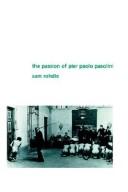| Listing 1 - 5 of 5 |
Sort by
|
Book
ISBN: 0253161312 Year: 1969 Publisher: London ; Bloomington : Indiana University Press,
Abstract | Keywords | Export | Availability | Bookmark
 Loading...
Loading...Choose an application
- Reference Manager
- EndNote
- RefWorks (Direct export to RefWorks)
CINEMA --- PASOLINI, PIER PAOLO (1922-1975) --- ITALIE --- ENTRETIENS --- CINEMA --- PASOLINI, PIER PAOLO (1922-1975) --- ITALIE --- ENTRETIENS

ISBN: 0851705189 Year: 1995 Publisher: London : BFI Publishing,
Abstract | Keywords | Export | Availability | Bookmark
 Loading...
Loading...Choose an application
- Reference Manager
- EndNote
- RefWorks (Direct export to RefWorks)
Book
ISBN: 2714414265 9782714414267 Year: 1981 Publisher: Paris Belfond
Abstract | Keywords | Export | Availability | Bookmark
 Loading...
Loading...Choose an application
- Reference Manager
- EndNote
- RefWorks (Direct export to RefWorks)
Authors, Italian --- Motion picture producers and directors --- Ecrivains italiens --- Producteurs et réalisateurs de cinéma --- Interviews --- Interviews. --- Entretiens --- Pasolini, Pier Paolo, --- Pier Paolo Pasolini ; entretiens avec Jean Duflot --- film --- literatuur --- Pasolini Pier Paolo --- Italië --- Kunst en politiek --- film en politiek --- 791.471 PASOLINI --- Producteurs et réalisateurs de cinéma --- Pasolini, Pier Paolo --- Authors, Italian - 20th century - Interviews --- Motion picture producers and directors - Italy - Interviews --- Pasolini, Pier Paolo, - 1922-1975 - Interviews --- Pasolini, Pier Paolo, - 1922-1975
Multi
ISSN: 14243792 ISBN: 129942841X 3035301492 Year: 2011 Volume: v. 24 Publisher: Oxford ; New York : Peter Lang,
Abstract | Keywords | Export | Availability | Bookmark
 Loading...
Loading...Choose an application
- Reference Manager
- EndNote
- RefWorks (Direct export to RefWorks)
Roland Barthes and Pier Paolo Pasolini were two of the most eclectic cultural personalities of the past century, as elusive as they were influential. Despite the glaring differences between them, they also shared a number of preoccupations, obsessions and creative approaches. Certain themes recur insistently in the works of both men: the pervasiveness of power and the violence inherent in the modernising process; the possibility of freedom and subjective autonomy; and the role of creative practices in a society configured as a desert of alienation. Despite this common ground, no systematic attempt at reading the two authors together has been made before now. This book explores this uncharted territory by comparing these two intellectual figures, focusing in particular on the similarities and productive tensions that emerge in their late works. Psychoanalysis plays a key role in the articulation of this comparison.
Barthes, Roland - Criticism and interpretation. --- Barthes, Roland - Philosophy. --- Pasolini, Pier Paolo - Criticism and interpretation. --- Pasolini, Pier Paolo - Philosophy. --- Pasolini, Pier Paolo, 1922-1975 -- Criticism and interpretation. --- Pasolini, Pier Paolo, 1922-1975 -- Philosophy. --- Languages & Literatures --- Philology & Linguistics --- Literature - General --- Barthes, Roland --- Pasolini, Pier Paolo, --- Philosophy. --- Criticism and interpretation. --- Barthes, R. --- Барт, Ролан --- Bart, Rolan --- Baruto, Roran --- בארת, רולאן --- بارت، رولان --- ロラン・バルト --- Luolan Bate --- 羅蘭・巴特 --- Pasolini, Pier Paolo --- Barthes --- Brisolin --- Collier --- fantasy --- Late --- Paolo --- Pasolini --- Peter --- Pier --- Pier Paolo Pasolini --- Power --- Roland --- Roland Barthes --- Subjectivity --- The novel --- the role of creative practices --- Two versions of Sade --- Viola --- violence --- Work
Book
ISBN: 0691031487 9780691031484 0691000344 9780691000343 Year: 1990 Publisher: Princeton Princeton University Press
Abstract | Keywords | Export | Availability | Bookmark
 Loading...
Loading...Choose an application
- Reference Manager
- EndNote
- RefWorks (Direct export to RefWorks)
The major Italian filmmaker Pier Paolo Pasolini was also a poet, novelist, essayist, and iconoclastic political commentator. Naomi Greene reveals to English-speaking readers the diverse talents that made him one of the most controversial European intellectuals of the postwar era, at the center of political and cultural debates still vital to our time. Greene presents Pasolini's films to the English-speaking world in full detail and in a rich critical context, using them to trace the evolution of his ideas and the details of his troubled personal life from 1950, when he settled in Rome, to 1975, the year of his brutal murder, apparently at the hands of a young male prostitute. "In her concise and sympathetic book, Greene intelligently explicates the political and social context within which Pasolini became both a leading figure and a significant heretic. He was an atheist who directed one of the few genuinely profound biblical films in the cinema, a communist who severely criticized many of the radical movements of modern Italy. Though he publicly acknowledged his homosexuality, he privately referred to it as his "sickness." As the book well documents, Pasolini was not a rebel but rather an authentic heretic who worked in contradiction to both his medium and milieu."--Choice.
Pasolini, Pier Paolo --- film --- filmgeschiedenis --- filmregisseurs --- twintigste eeuw --- Italië --- Pasolini Pier Paolo --- 791.471 PASOLINI --- CPP --- Pasolini, Pier Paolo, --- Criticism and interpretation. --- Cinema films --- Directing (Arts) --- Italy --- Cinema --- Films (Motion pictures) --- Criticism and interpretation --- Pasolini, Pier Paolo, 1922-1975 - Criticism and interpretation. --- 791.44.071.1 --- 791.43 --- #SBIB:309H1323 --- 791.43 Filmkunst. Films. Cinema --- Filmkunst. Films. Cinema --- 791.44.071.1 Filmregisseurs. Cineasten. Filmproducers --- Filmregisseurs. Cineasten. Filmproducers --- Films met een amusementsfunctie en/of esthetische functie: auteurs
| Listing 1 - 5 of 5 |
Sort by
|

 Search
Search Feedback
Feedback About
About Help
Help News
News